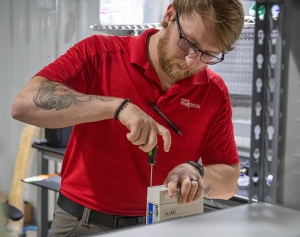by
John R. Fischer, Senior Reporter | May 16, 2022
From the May 2022 issue of HealthCare Business News magazine
When in hospital, patients see the various pieces of equipment that providers use daily. From vital sign monitors to MR systems, this exposure helps them understand the important role and duties of each clinician and staff member. But what they do not see are the BMETs and clinical engineers who make sure the equipment is operating correctly and repair them when problems arrive.
Additionally, hospital executives and administrators may not be fully aware of the work that these HTM professionals provide to hospital operations. “Some hospital leaders still see us as a break-fix department. They don't understand that we get involved with equipment assessment, equipment acquisition, patient safety, emergency management and so much more,” Danielle McGeary, vice president of healthcare technology management at the Association for the Advancement of Medical Instrumentation (AAMI), told HCB News.
McGeary chalks this up to a lack of awareness about the field, which as a result, has led to nationwide shortage that is expected to grow over the next few years as the majority of biomeds retire. Replacing them has also become a challenge following the closure of several two- and four-year training programs at universities. HCB News sat down with McGeary and other experts in the field to discuss these challenges and the various tactics they are employing to get the word out about BMETs and recruit new personnel.
A nationwide shortage
According to 24x7 Magazine, a publication that covers the HTM field, 40% of biomeds are 55 and older, and 22% are over 60, meaning that most are planning to retire in the next few years. As a result, thousands of vacancies are expected, with the U.S. Bureau of Labor Statistics predicting nearly 3,000 unfilled BMET positions by 2029. Additionally, young and middle-aged BMETs are increasingly leaving the profession for other careers because of low salaries and feeling overworked. The pandemic has only exacerbated these issues.
Richard Marshall, director of operations for HSS in the technologies service division, says replacing these outgoing workers will be a challenge because many young people are unaware that there is such a career. "I think the best course of action is just promoting the field. I think that's something that's been lacking for years. No one really knows about the field. They happen on it by chance or through the military.”
With awareness low, universities have struggled to recruit students for their BMET and clinical engineering programs and as a result, been forced to close them due to lack of enrollment. In 2017, AAMI reported that more than 30 schools shut down their programs, with more following suit in the years after.
